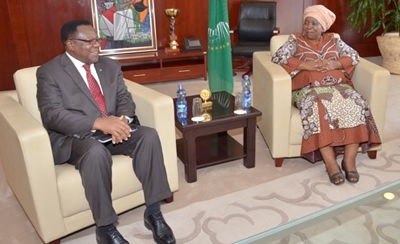
“A severe critical technical skills emergency is gripping Africa and something needs to be done immediately for Africa to be transformed,” said Prof Emmanuel Nnadozie, Executive Secretary of the ACBF in his opening remarks during a briefing session which was attended by the Chairperson of the African Union Commission (AUC), H.E. Dr. Nkosazana Dlamini-Zuma, and key management staff of the Commission on Thursday 26th November.
Prof Nnadozie was in Addis Ababa, Ethiopia, to update the representatives of the AUC on the different activities that the Foundation has undertaken for the Commission in relation to the capacity dimensions of Agenda 2063.
ACBF has been supporting the African Union’s work and achieved landmarks since the work began. One such achievement is the completion of a report on the threats and opportunities linked to the implementation of Agenda 2063.
In presenting the findings of the report, Prof Nnadozie indicated that the areas of intervention identified by the Foundation were not exhaustive but rather indicative of some of the foundational capacity enhancing interventions that can be carried out.
He indicated the need for an innovative multi-level multi-stakeholder approach that provides a new way to address capacity development alongside traditional approaches.
The AU Chairperson expressed satisfaction on the work done by the Foundation and reiterated the need for ACBF to come up with an implementation plan to develop the required capacity.
The Executive Secretary also used the occasion to present the final report on the Digest of OAU-AU Treaties, Conventions and Agreements 1963 to 2013 which was ACBF’s contribution to the 50th Anniversary of the OAU-AU. He explained that the digest aimed to enable AU member states to see how far they had gone in terms of ratifying the various legal instruments of the continental body.
The AUC Chairperson appreciated the ACBF’s gesture and made suggestions on improving the quality of the report so that it could be presented at the AUC Executive Council during the next AU Summit in January 2016.





